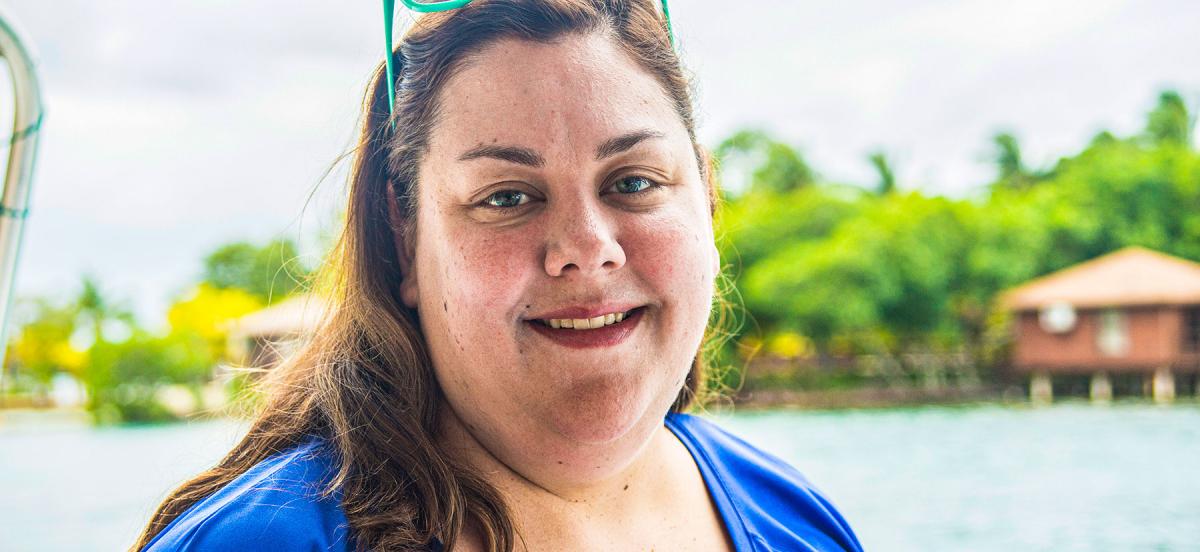Kristen Whalen Earns Kaufman Foundation Integrated Research-Education Grant

Assistant Professor Kristen Whalen, picutred here over winter break 2019 when she took her “Advanced Topics in Biology of Marine Life” class to Roatán, Honduras, to explore tropical coral ecosystems. Photo by Patrick Montero.
Details
The assistant professor of biology will receive $100,000 over two years to fund her lab’s research on how phytoplankton evade or stave off viral mortality.
Assistant Professor of Biology Kristen Whalen is one of three scientists who has been chosen for this year’s Integrated Research-Education Grants from the Charles E. Kaufman Foundation, a supporting organization of the Pittsburgh Foundation. The foundation awards grants to scientists at Pennsylvania colleges and universities in support of fundamental research in biology, chemistry, and physics. Whalen will receive $100,000 over two years for her project, “Elucidating the protective role of bacterial signals in algal host-virus dynamics," which seeks to understand how bacterial signals drive cross-kingdom interactions in marine systems.
“I was excited and grateful to be selected,” she said. “Sometimes the research questions you ask require expensive equipment or instrumentation to complete the analyses. Grants such as the Kaufman funds undergraduate students during the summer to engage in state-of-the-art research with equipment and resources that will lead to new discoveries. This funding is critical to allow myself and our students to not limit ourselves in the questions we ask if experiments are prohibitively expensive.”
Whalen’s lab explores how microbes shape marine systems, particularly regarding the interactions between bacteria and phytoplankton. Previously, their work described how a signal that a marine bacterium makes to communicate with one another disrupts DNA replication and repair in the phytoplankton host. That signal also provides the phytoplankton host with some protection from dying from viral infection.
“How this signal allows the phytoplankton host to evade or stave off viral induced death is the focus of this grant,” said Whalen. “In this integrated research-education grant, undergraduate researchers will use our phytoplankton-virus model in experiments to tease apart how the bacterial signal remodels eukaryote host physiology to promote evasion from viral lysis, ultimately revealing how bacterial signals drive cross-kingdom interactions.”
Though this work, like all of Whalen’s research, is specific to the ecosystem of the ocean, discoveries made in the lab could be applied to viral interactions with the human microbiome, which, says Whalen, can help further our understanding of the influence of bacterial signals in complex systems.
One particularly exciting part of this research is how much of it will be done by Haverford students. They will be involved at all levels in research supported by the grant, from collecting samples to data analysis and interpretation. They will also be involved in the collaborative writing process of preparing related manuscripts for publication. Whalen, who credits her own undergraduate science mentors with nurturing her skills and self-confidence in the field, particularly relishes the part of her job where she guides students through this kind of hands-on research in the lab.
“In traditional undergraduate lecture-based courses, students rarely experience the feeling of self-discovery at the lab bench, and too much emphasis is placed on ‘getting the right answer,’ when the process of learning to ask questions and seeking answers is really what is important,” she said. “Haverford’s model of senior thesis research at the undergraduate level fosters critical thinking and problem-solving skills as students conceive, design, and execute their own projects. As an educator, it is exciting to be involved in this way in the process of student learning.”
The Charles E. Kaufman Foundation has awarded 81 grants totaling $16.6 million since 2013. This year its seven-member Scientific Advisory Board reviewed 121 inquiries from scientists at 23 colleges and universities and selected 13 research proposals from 10 institutions for $2.1 million of funding.



